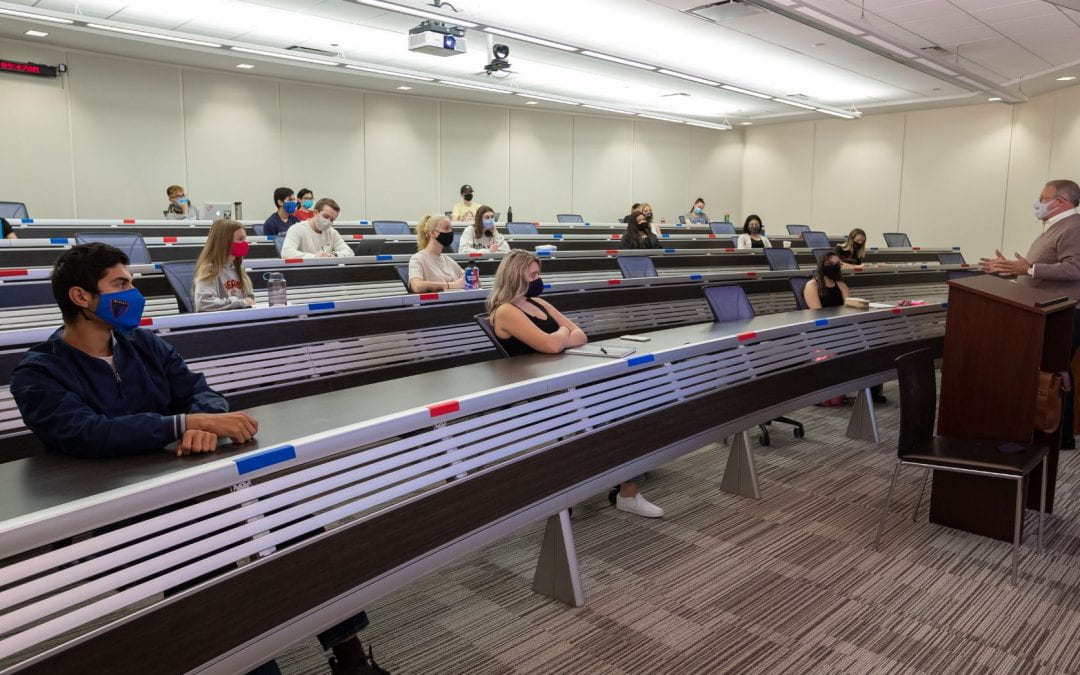
Photo by Jeff Carrion/DePaul University
By Nadia Alfadel Coloma
The Kellstadt Graduate School of Business and the Driehaus College of Business are gearing up to offer in-person learning opportunities on campus this fall. We’re excited to safely welcome students back into our classrooms, but we also recognize the importance of flexibility to accommodate different learning styles and student needs.
Courses will remain fully online this spring and summer, but this fall we’ll offer five course modalities that include in-person learning, online learning and a blend of in-person and remote. To help you prepare for fall class registration, which opens April 29, here’s a description of each of the college’s fall course modes.
- On-Campus Mode (P)
If you’ve missed learning in the classroom, this course mode is for you. Registering for the “P” mode means you attend class on campus with your peers and faculty member. On-demand and pre-recorded course content on D2L will complement the in-person learning experience. What will it be like on campus? DePaul and the business college will share information about on-campus policies and guidelines regarding health and safety as we get closer to fall.
- Flex Mode (FL)
Maybe you miss being in the classroom, but you also enjoy the perks of online learning. The Flex mode offers the best of both worlds, allowing you to choose between attending class in-person on one day or via Zoom synchronously the next. The advantage of Flex is that you have the option to choose, based on the demands of your work, life or schedule – where you want to attend class. Your faculty member will teach from a classroom on-campus that is equipped with technology to engage both in-person and remote learners simultaneously.
- Hybrid (HB)
The Hybrid mode, like Flex, also offers the best of online and in-person learning. However, there are two main differences. When you register for a “HB” course, the expectation is that you will alternate between attending class in person one session and engaging with the class online the following session, and so on. Another difference is that the online component of Hybrid is asynchronous, which means students access pre-recorded course content on-demand versus synchronous live class sessions on Zoom, like you would with Flex.
- Online Hybrid (OH)
Online Hybrid is a fully online course mode that blends synchronous learning (remote into a live class via Zoom) with asynchronous learning (engage with class content on your own, on-demand). This option allows you the opportunity for regular live interactions with your faculty member and peers since tuning into the class live via Zoom is an essential part of the class experience.
- Online Asynchronous (OA)
This popular online mode is the most flexible, allowing you to fit the course around the demands of your own schedule. All course content is pre-recorded with optional live remote activities. As with all courses at Kellstadt, regardless of mode, your faculty member is available to connect with you on an individual basis.
In truth, there is no going “back” to business as usual. At Kellstadt, we are committed to moving forward in innovative ways that inspire learning, connection and a sense of empowerment in our students. Talk to a Kellstadt advisor if you have questions about the fall course modalities, and stay up-to-date on the college’s fall 2021 plans on this FAQ webpage.
DePaul University continues to follow health and safety guidelines from local and state officials to protect the wellbeing of our campus community.
Nadia Alfadel Coloma (MA ’11) is a communication analyst at the Driehaus College of Business and the editor of the Inside Kellstadt blog.

By Jimmy Dooley
I decided to go to graduate school amidst a global pandemic, largely because of the low interest rates for student loans. I studied advertising and marketing at Southern Illinois University, Carbondale and felt I had the entrepreneurial spirit but lacked the resources or ideas necessary to start my own business. When I was accepted into the Kellstadt Graduate School of Business, I thought the Master of Science in Entrepreneurship program would round out some of my weaknesses.
This program feels less like a series of classes, and more like a combination of lessons
The classes I have taken at Kellstadt are all connected. I often find myself referencing concepts from one class in an assignment for another. In my undergraduate program I questioned the relevance of my curriculum, but the Master’s in Entrepreneurship program is simple; it gives students exactly what they need to be an entrepreneur.
During my second quarter I signed up for the “Social Enterprise” class, hoping to learn more about how to create a sustainable business of my own. The course revolves around a team consulting project for a few different mission-driven ventures in Chicago. A “mission-driven venture” or “social enterprise” are terms for businesses that are driven not solely by profit but by the greater purpose of helping others.
My group and I were assigned HHPLIFT, an online nonprofit marketplace for artisan crafted goods. HHPLIFT creates business for social enterprises with workforce development programs that support and expand job opportunities for people with significant barriers to fair wage employment.
We were charged with creating a marketing strategy for a new product line, launching this spring, crafted by refugee women in a fair-trade work environment.
Halfway through this team project I recognized a big problem in the social enterprise space: the marketing was sloppy. Branding was all over the place, and most companies fail to deliver the story customers want. After analyzing numerous competitors, I recognized a clear need for an advertising agency devoted to the social enterprise industry.
I recognized the problem; how do I create the solution?
My idea was simple. Why not create my own advertising agency solely focused on social enterprises and sustainable businesses? I just needed help creating the solution.
So, I signed up for 1871, Chicago’s digital start-up community.
When I first started my degree, I was really lost on how to get more involved at Kellstadt. I figured there wasn’t much point in joining a club if I was only going to be there for a year, much less join an organization that can’t even meet in person. But despite school being online, I found I had everything I needed to turn an idea into a business.
1871 is a one-stop-shop for entrepreneurs and a fantastic resource for DePaul students. They take your idea at any stage of the business-planning process and get you the help you need. Whether you’re creating a new social network or re-inventing the wheel, 1871 has the answer to your questions.
Meanwhile, towards the end of the social enterprise class, we learned about the different types of funding models for mission-driven businesses. One funding model that stuck out to me was the hybrid model, where a company is for-profit and socially responsible. I decided this was the direction I wanted to take for my own social enterprise venture.
Time doesn’t stop, even during a global pandemic
Time has not slowed down since the pandemic started. Businesses have had to adapt to the new environment or close, and I have a fraction of the social life I once had— but now I have the time to pursue my passion. A lot of my distractions have vanished, and I’ve had to make an easy but critical decision. Do I kill the time the pandemic has given to me, or do I take advantage of it?
Without the help of my professors at DePaul and the staff at 1871 I wouldn’t have the confidence I have now to pursue my idea. I’m slowly working on putting thoughts into action and plan on committing myself full-time to my venture once I graduate in June.
If there is one thing the MS in Entrepreneurship program at Kellstadt has taught me it’s how to identify a problem and create the solution. Today, I’m no longer the confused advertising student from last September. I can be the next entrepreneur, and I have the resources available to me—even in this virtual space—to bring my ideas to life.
A revised curriculum for the MS in Entrepreneurship Program at the Kellstadt Graduate School of Business is debuting completely online in fall 2021. Learn more on the program website.
 Jimmy Dooley graduated from Southern Illinois University, Carbondale with a bachelor’s degree in journalism. He spent most of his undergraduate degree underwater as a four-year member of the Saluki men’s swim team and attributes most of his work ethic to his athletic career. With the help of 1871, Jimmy is currently pursuing his passion of starting an advertising agency for sustainable businesses.
Jimmy Dooley graduated from Southern Illinois University, Carbondale with a bachelor’s degree in journalism. He spent most of his undergraduate degree underwater as a four-year member of the Saluki men’s swim team and attributes most of his work ethic to his athletic career. With the help of 1871, Jimmy is currently pursuing his passion of starting an advertising agency for sustainable businesses.
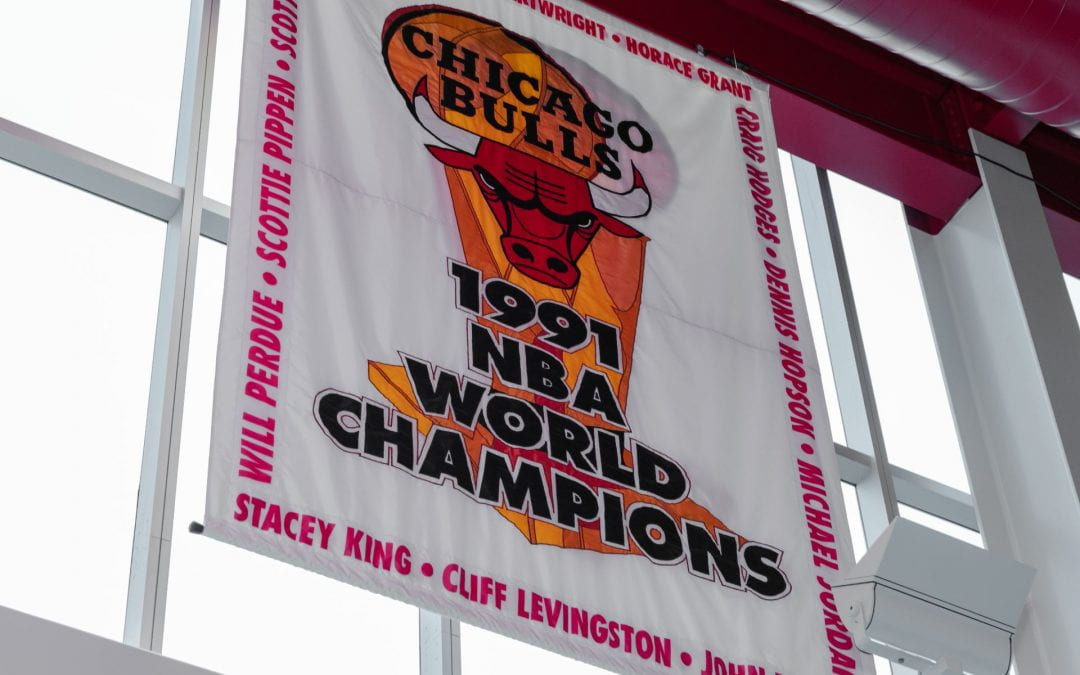
By Marisa Farella
Well, sports fans, the “Behind the Scenes with Chicago Sports Organizations” class has done it again, and this time, virtually.
For those of you who aren’t aware, the Driehaus College of Business offers a class to both Kellstadt and undergraduate students looking to explore careers in the sports business industry. Andy Clark, director of the sports management programs at the Driehaus College of Business, developed this course to bring students deep into the offices of the most powerful companies in Chicago sports, including Gatorade, McDonald’s, Intersport, the Chicago Cubs, the Chicago Bears and many more.
If you are a student who has heard about this class, you know about the long-awaited anticipation for it to be offered each year. I was one of those students waiting eagerly to take it, so when I heard it was going to be offered during the December intercession as an accelerated, two-week course, I was ecstatic. But like most students, I was also a bit disappointed that the experience would be virtual due to the pandemic. I was skeptical about how impactful the virtual learning experience would be, but my nerves were put to rest very quickly.
Learning From Some of the Best in the Game
Throughout the duration of the course, we had the opportunity to connect with top industry professionals as they discussed their education and varying career experiences that have contributed to where they are today.
Class speakers included Molly Carter, DePaul University alumna and former president of Kobe Inc., as well as Kelly Flatow, executive vice president of events for the NBA, who discussed their experiences navigating their careers as women in sports. We also had a session with the Chicago Bulls organization, which was highlighted by a special appearance by their president Michael Reinsdorf. In addition, the class had the honor of connecting with Bonner Paddock Rinn, a triathlon athlete and World Record holder, a New York Times best-selling author, and founder of One Man Foundation— all things he accomplished as a man with Cerebral Palsy.
We also had the honor of meeting many accomplished DePaul alumni who currently hold positions in the sports industry, including Mike Gordon, general manager at Northwestern Sports Properties and Diego Chadha, account executive at Corporate Partnerships at Marquee 360., among others. We also got to hear from DePaul’s new athletic director, DeWayne Peevy, as well as DePaul Women’s Basketball Coach Doug Bruno, who joined us to discuss the power of hard work and persistence. I was truly inspired by all the guest speakers in this course.
Learning by Doing: A Chance to Play
The game didn’t stop there.
We had the opportunity to gain real-life experience while working with 4Front, a Chicago-based sports marketing agency, on a class project that involved developing a marketing strategy that was then pitched and presented to 4Front’s team. We were put into groups and each group did a phenomenal job outlining their proposed strategies to 4Front, who later relayed our ideas back to their real-life clients.
All in all, this course ended up being one of the most valuable courses I have taken in my five years as a Blue Demon, regardless of whether I pursue a career in sports upon graduating in June. I was able to learn so much from this opportunity to connect with powerful, intelligent and generous professionals, and I’m sure anyone who has taken this course before would confidently agree.
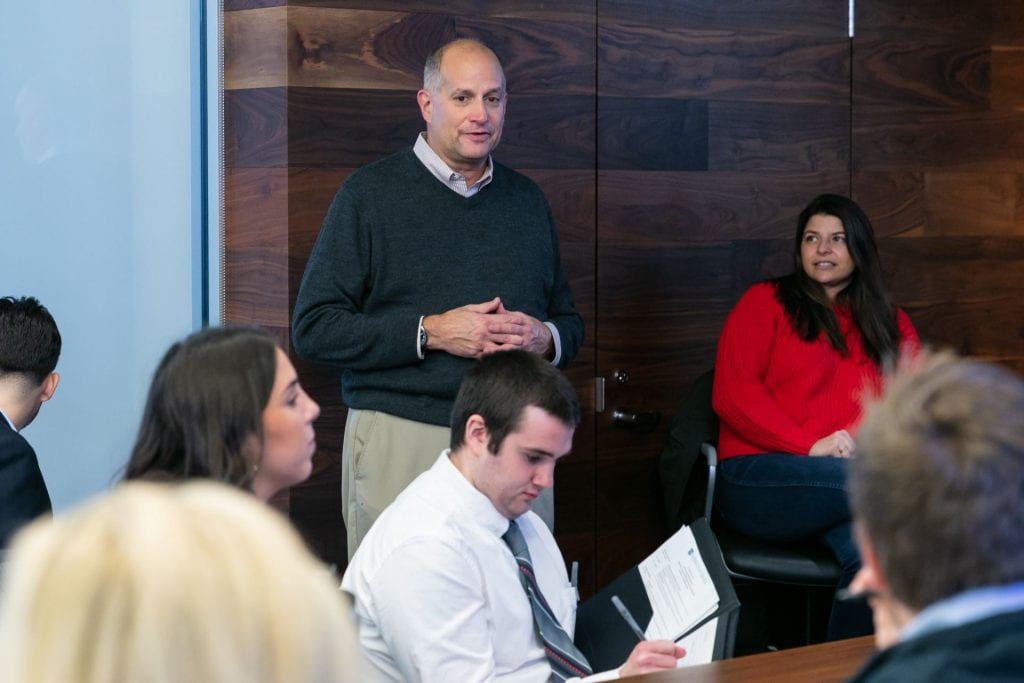
Andy Clark introduces the Chicago Bulls staff during the DePaul Sports Management Behind the Scenes with Chicago Sports Organizations tour, Monday, Dec. 2, 2019 at the Advocate Center in Chicago, IL. (DePaul University/Randall Spriggs)
The Value in the Virtual Experience
In the end, I was happy that the online format still provided a seamless experience. If anything, being virtual allowed us to connect with a wider range of speakers and panelists. Yes, the office and venue tours of past classes would have been a cool experience, but the value of this class lies in the connections, networking opportunities and insights we gained from each guest speaker.
If you are a DePaul student interested in learning more about the sports industry, this course will be of great value to you. Contact your academic advisor for more information about DePaul’s Sports Business program.
Thank you for everything, Coach Clark! Great game.
 Marisa Farella is a current MBA candidate and graduate assistant at Kellstadt Graduate School of Business. She graduated from DePaul University in 2018 with her BA in public relations and advertising, making her a proud soon-to-be Double Demon. In addition to her studies, Marisa has taken her love for writing and creativity a step further. She is the self-published author of her debut collection, “Truth or Dare: Poetry,” which is available on Amazon.
Marisa Farella is a current MBA candidate and graduate assistant at Kellstadt Graduate School of Business. She graduated from DePaul University in 2018 with her BA in public relations and advertising, making her a proud soon-to-be Double Demon. In addition to her studies, Marisa has taken her love for writing and creativity a step further. She is the self-published author of her debut collection, “Truth or Dare: Poetry,” which is available on Amazon.
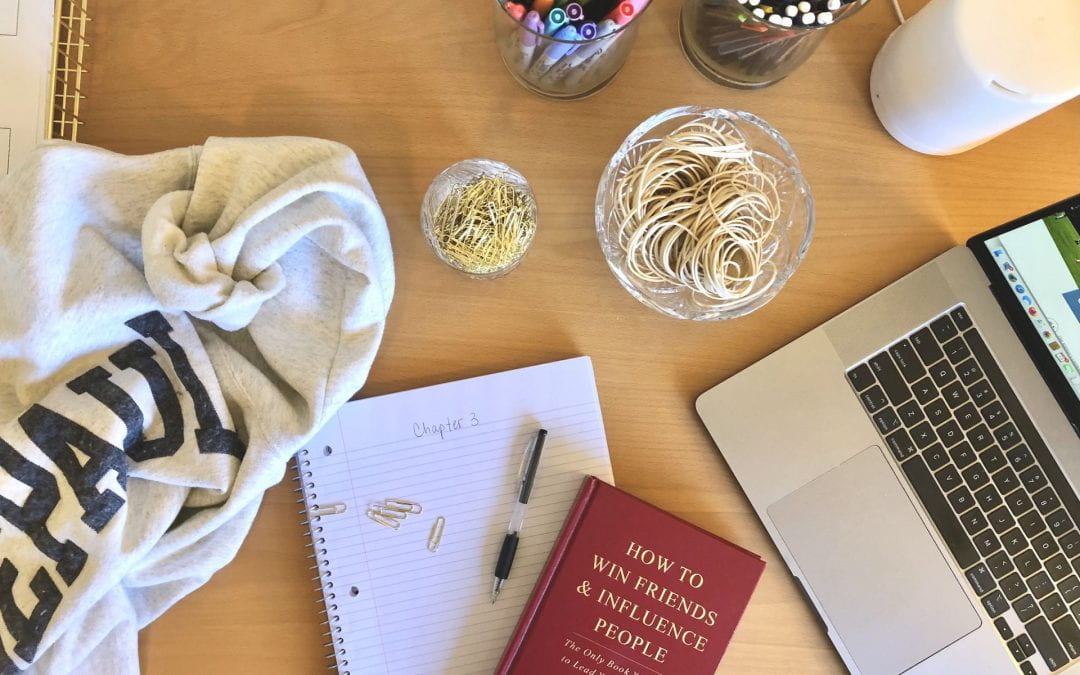
Before you say anything, I know — this whole “virtual learning” thing is not the most ideal situation and it is not the way many of us wish we would be spending our college experience. We can’t ignore the emotions we are all facing, but we also can’t change the circumstances (besides wearing a mask, of course). What we can do is trust the phenomenal faculty and staff we have here at DePaul University and the Kellstadt Graduate School of Business. Our professors and advisors are working diligently to provide us a sense of security, understanding and support, which I know the current student body is incredibly grateful for.
This time we are going through will bring immense levels of challenge that go beyond our course content, so it is important that each student is doing what they can to better prepare themselves. Below is a checklist that has helped me optimize my productivity while taking virtual classes. We might as well make the most of it!
1. Find your own space
Finding your own study space is a valuable tactic while completing lectures, class Zoom meetings, appointments and homework. There is much to be said about making an at-home space as similar to a classroom setting as much as possible. Everyone’s space circumstances differ, so whether it is an entirely different room or a small desk in your bedroom, having a designated destination for school work will get your mind and body ready for anything the school day brings.
Personally, I have transformed a spare room in my house into a little home office. I made this experience an opportunity to have some fun by redecorating this room into a comfortable school work sanctuary. This space prepares my mind for my responsibilities each day.
2. Communicate with professors
This, by far, is one of the most powerful tools I have implemented in my quarterly routine. Since we can’t meet face-to-face, it’s important to me that I grow and develop connections with my professors. Prior or within the first week of classes, I take time to reach out to each professor I have that quarter. I send them a professional email introducing myself and asking if they would be available to connect via Zoom (Zoom is a personal preference; others might continue to communicate in an email thread).
Opening the line of communication, breaking the ice and having a conversation with your professors will not only benefit you throughout the quarter with your studies, but it’s a great networking tactic as well. It is quite inspiring to feel the support and care of the Kellstadt faculty. This is where your network grows, so water these professional relationships and opportunity will bloom! I promise you — your professors will recognize the effort and admire your dedication, helping you make the most of your grad school experience.
3. Connect with classmates
I am currently enrolled in the Full-Time MBA program and there is not a single day that I don’t recognize and express gratitude for my classmates. Graduate school is a unique and challenging time in all our lives and it’s an honor to be learning alongside such extraordinary and intelligent students. DePaul introduces us to one another, allowing us to form lifelong friendships.
The relationships you make at Kellstadt will be of great value to your learning experience. Being virtual has directed us toward great technological tools, making it easy and accessible to communicate in small or large groups about projects, course content, student organizations and virtual events. My classmates and I also use Slack and GroupMe to communicate. If you are not yet familiar with these tools, no need to worry. Download them and you’ll learn them in no time.
4. Stay organized
Organization will be your lifestyle hack while taking classes virtually. Whether it’s a notebook planner, your mobile phone calendar, Post-it Notes, etc., planning your responsibilities on different timelines will help you prioritize and practice successful time management. Bring out the highlighters, Sharpies and more. This is another great opportunity to get creative and have fun with planning.
5. Ask for help
People are sometimes mistaken when attending graduate school. Yes, it comes with rigorous courses and new challenges, but you are most definitely not alone in the process. Kellstadt has phenomenal faculty and staff, so there is always someone available to help you reach your goals by assisting you toward your utmost potential. Just because you’re in graduate school now, it does not mean you can’t ask for help. We are always learning something new.
In addition, don’t be afraid to provide feedback to your professors. Though Kellstadt has always offered online courses, virtual learning is new to some professors and staff, as well. Take advantage of these conversations and provide feedback on how your courses are going or where you feel students could use more support.
6. Take breaks
…Because even graduate students need to manage their personal lives. These breaks will help your mind decompress, relax and ultimately, obtain more information in the long run. Make it a priority to plan 15- to 30-minute breaks into your daily schedule.

Marisa Farella is a current MBA Candidate and Graduate Assistant at Kellstadt Graduate School of Business. She graduated from DePaul University in 2018 with her Bachelor of Arts degree in public relations and advertising, making her a proud soon-to-be Double Demon. In addition to her studies, Marisa has taken her love for writing and creativity a step further. She is the self-published author of her debut collection, “Truth or Dare: Poetry,” which is available on Amazon.
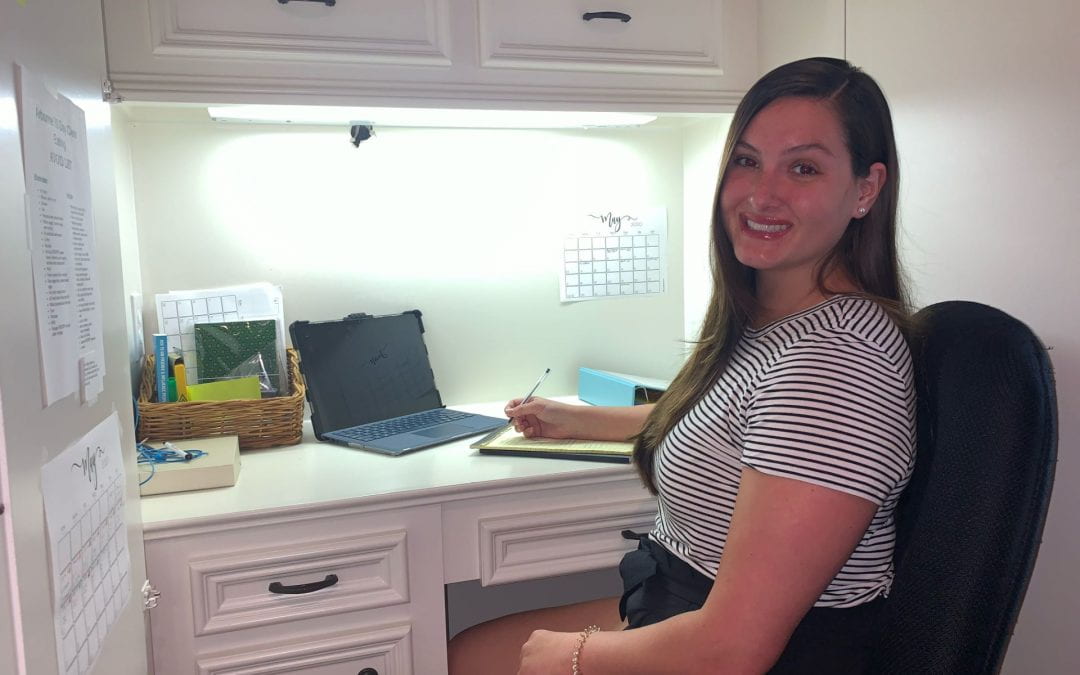
By Laura Tenney
In this time of COVID-19, we’ve all had to adapt to a new normal and make adjustments, big and small, to our everyday lives. Many of us are working remotely or taking online classes for the first time, and have needed to find new ways to succeed in this new environment.
As a student in the Kellstadt Graduate School of Business, I’m taking online classes like so many and have had to establish a new routine. I thrive on structure so having a schedule, even if it is self-implemented, is very important to me.
Here are some time management strategies I’ve implemented to help keep me organized and motivated:
Start the week with a plan. At the beginning of each week, I write down every assignment for that week for each class. This helps me visualize what needs to be done. I like to include a time estimate on each activity or a page count so I know what items can be completed quickly and what will require a bigger chunk of time. I also include larger project due dates that are a few weeks away, so they do not slip my mind.
Create a to-do list for each day. Once I know what needs to be done for each class throughout the week, I assign items to specific days. You can do this by sticking to the original class schedule before classes were moved online. For example, study Economics on Monday, Management on Tuesday, etc. Or you can do bits of each class each day to vary the content and remain engaged.
Set aside blocks of time for schoolwork. Whether it’s working for an hour or three hours straight, create designated blocks of time throughout the day for schoolwork. I usually try to work for an hour in the mornings then take a 20-minute break. I find these shorter periods of time work best for my attention span and tend to minimize burnout.
Create a schedule that works for you. Some people are morning people and others are night owls. Find what works best for you. I work best in the morning from about 9 a.m. to 1 p.m. so I make sure I dedicate this time to schoolwork. If you are more of an afternoon person and enjoy taking your mornings slow, set aside time after lunch to focus on what needs to be done for that day.
Make time for breaks. While some of us would love to finish our work as soon as possible during the day to move on to our down time, breaks are important for rejuvenating the mind and making sure you’re fully understanding the material you’re studying. Schedule breaks into your day, something as simple as a 15-minute break for coffee or a short scroll through Instagram. Or a longer break like going for a walk or cooking a meal. Set a timer for your break so that you stay on track and get back to schoolwork in a timely manner.
Have a cutoff time. With home life and school life blending together, it’s important to try to keep some sort of normalcy in our day-to-day lives. I aim to complete all my work by 5 p.m. so that I can enjoy my evening and spend time with my family and pets. Having a predictable cutoff time can help you manage your productivity and stress levels. Here is a sample schedule:
8 a.m. Wake up and coffee
9 a.m. Watch a lecture
10 a.m. More coffee
10:30 a.m. Reading/lecture
11:30 a.m. 15-minute break
11:45 Reading/lecture
1 p.m. Go for a walk/ exercise
2:30 p.m. Reading/lecture
4 p.m. Done for the day! Check off what you’ve accomplished and mentally plan for the next day
In the end, you know what works best for you, so structure your time accordingly. Plan your schoolwork around your most productive hours of the day, make sure to schedule in breaks, and try as much as you can to include physical activity into your week to stay healthy and relaxed in body and mind.
Laura Tenney is an MBA student, specializing in accounting, at the Kellstadt Graduate School of Business and a graduate assistant at the School of Hospitality Leadership in the Driehaus College of Business. She earned her bachelor’s degree in accounting from Texas State University.










Recent Comments